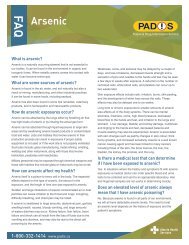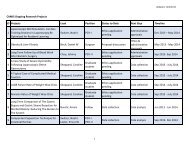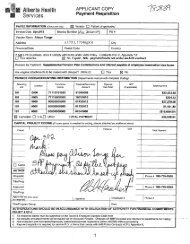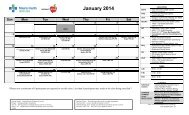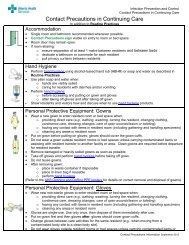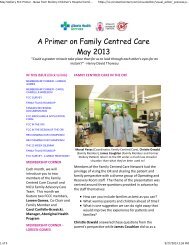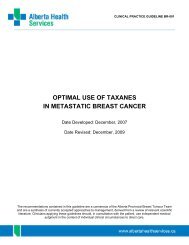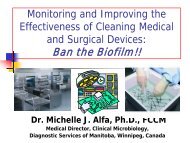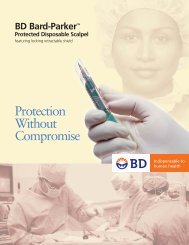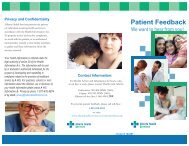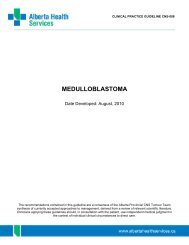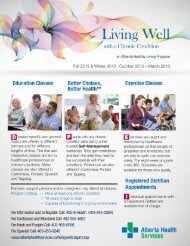The Addicted Employee: After Treatment - Alberta Health Services
The Addicted Employee: After Treatment - Alberta Health Services
The Addicted Employee: After Treatment - Alberta Health Services
Create successful ePaper yourself
Turn your PDF publications into a flip-book with our unique Google optimized e-Paper software.
information for leaders | the addiction employee: after treatment<br />
What the workplace can do<br />
Policies and programs<br />
It is very important for workplaces to develop clear policies<br />
that encourage early intervention with troubled employees.<br />
Some organizations will achieve this by developing an alcohol<br />
and drug policy, others will call it a “fitness-for-work”<br />
policy. Either way, the policy will outline ways for employees<br />
to get help and steps to support them through treatment and<br />
long-term recovery. Some policies also outline whether or<br />
not alcohol may be served at company functions. If alcohol<br />
is served, the policies make provision for safe and responsible<br />
use as well as taking the needs of non-drinking and recovering<br />
employees into account.<br />
Larger workplaces may also have employee and family<br />
assistance programs (EFAPs) to assist employees experiencing<br />
personal problems that may or may not be affecting<br />
their work performance. Small companies may not have<br />
an EFAP but they can still assist employees by maintaining<br />
a current listing of local resources available in the community.<br />
Education<br />
Studies indicate that employees returning from treatment<br />
find it difficult when their supervisors and co-workers<br />
are not knowledgeable about addiction. <strong>The</strong> process of an<br />
employee returning to work is much smoother and more<br />
successful when all staff are knowledgeable about addiction<br />
and recovery.<br />
Education may be the easiest step a workplace can take in<br />
supporting recovering employees. Co-workers who are<br />
knowledgeable about alcohol, other drug and gambling<br />
problems will understand that, for the addict, total abstinence<br />
becomes a lifelong goal. <strong>The</strong>y will also understand that recovery<br />
is a process that requires ongoing efforts to maintain<br />
change. That is why people who have chosen to quit forever<br />
are called “recovering.”<br />
Education about relapse is also important. Many people<br />
recovering from alcohol, other drug and gambling problems<br />
will relapse at least once. A relapse is not necessarily a sign<br />
of failure. A relapse can offer the person an opportunity<br />
to fine-tune a part of their ongoing recovery program<br />
that is not working well.<br />
Workplace peer support teams<br />
Many workplaces recognize the value of peers helping<br />
peers and set up peer support teams. When people have<br />
personal problems, they often talk to their friends first.<br />
Co-workers can be very helpful in encouraging employees<br />
with personal problems to seek help.<br />
This is especially true if they have been trained and are<br />
familiar with the kinds of supports and resources available to<br />
help. Peer support team members also know the difference<br />
between offering support and encouragement and the need<br />
for professional help.<br />
Peer support teams can be an excellent support for recovering<br />
employees. Team members may have experienced<br />
personal problems themselves and can offer an understanding<br />
ear as well as their personal recovery successes. Most<br />
importantly, peer support team members are available on<br />
site, offering a ready source of confidential help and<br />
encouragement.<br />
Workplace support groups<br />
Larger workplaces will sometimes host 12-step support<br />
group meetings on site. Twelve-step support groups are independent,<br />
worldwide fellowships of men and women who<br />
meet with the sole purpose of helping one another get<br />
or stay clean and sober or gambling-free. Some examples<br />
of 12-step groups are Alcoholics Anonymous, Narcotics<br />
Anonymous and Gamblers Anonymous. A workplace hosts<br />
these self-help group meetings by offering them a place<br />
in which to meet. <strong>The</strong> group runs itself.<br />
Tips for the workplace<br />
• Develop and follow clear policies that encourage<br />
early recognition of troubled employees and that<br />
support them through treatment and long-term<br />
recovery.<br />
• Offer services that assist troubled employees through<br />
an employee assistance program and/or identify<br />
resources available in your community.<br />
• Develop education programs about alcohol, other<br />
drugs and gambling for all staff.<br />
• Develop, train and participate in peer support teams.<br />
• Make group support for recovering workers available<br />
at your worksite.<br />
• Recognize the needs of recovering employees when<br />
planning social events.<br />
What workplace leaders can do<br />
Following are some specific steps that HR and/or<br />
the supervisor can take to ensure recovering employees<br />
a smooth transition back to work.<br />
Return-to-work meetings<br />
It can be very useful for the organization to have a meeting<br />
with the returning employee prior to the date the employee<br />
actually returns to work. Depending upon the size of the<br />
workplace, the employee may meet with a human resources<br />
professional, a health care provider, the supervisor or some<br />
combination of these individuals. Often the recovering<br />
worker is wondering about confidentiality—who knows<br />
why I have been away and what have they been told?<br />
Sometimes they fear that others will treat them differently<br />
or avoid them altogether. <strong>The</strong>y may even be unsure about<br />
the company’s expectations about job performance or<br />
follow-up requirements.



